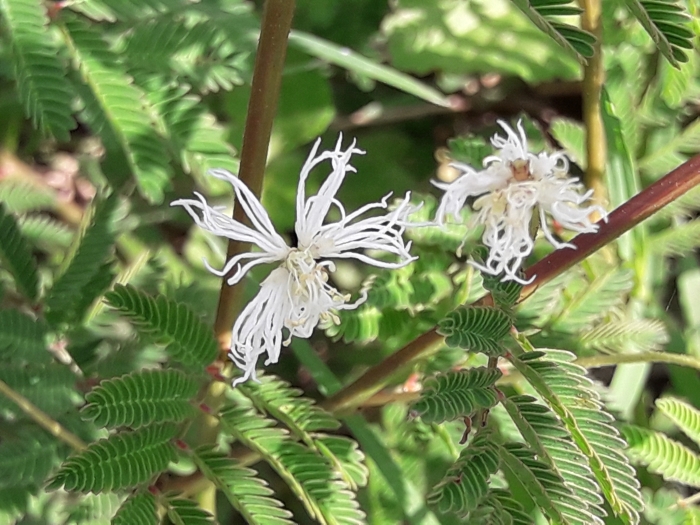Prairie Acacia
(Desmanthus virgatus)
Prairie Acacia (Desmanthus virgatus)
/
/

© José Gerardo Velasco
CC BY-SA 4.0
Image By:
© José Gerardo Velasco
Recorded By:
Copyright:
CC BY-SA 4.0
Copyright Notice:
Photo by: © José Gerardo Velasco | License Type: CC BY-SA 4.0 | License URL: http://creativecommons.org/licenses/by-sa/4.0/ | Uploader: jgvelasco | Publisher: iNaturalist |























Estimated Native Range
Summary
Desmanthus virgatus, commonly known as Fern Acacia, is a deciduous shrub or small tree native to a variety of habitats including grasslands, open woodlands, and along streams in the southern United States, Mexico, Central America, South America, and the Caribbean. It typically grows 5 to 10 feet tall and can produce up to 50 slender, flexible stems from a woody taproot. Prairie Acacia is well-adapted to clay and sandy soils and can survive lower altitudes. During dry conditions, it may die back to the root but resprouts with the return of moisture.
Prairie Acacia is valued for its ability to fix nitrogen in the soil, which improves soil fertility and aids in erosion control. Its fine-textured foliage and small, ball-shaped white flowers, which appear in the summer, add a delicate texture to garden settings. It is often used in xeriscaping, revegetation projects, and as livestock forage due to its resilience and low water requirements. In cultivation, it prefers full sun to partial shade and can tolerate a range of soil types, provided they are well-drained. While it is drought-tolerant, additional watering can promote more lush growth. Gardeners should be aware that in some regions, it can become weedy or invasive, so monitoring and management may be necessary to prevent unwanted spread.CC BY-SA 4.0
Prairie Acacia is valued for its ability to fix nitrogen in the soil, which improves soil fertility and aids in erosion control. Its fine-textured foliage and small, ball-shaped white flowers, which appear in the summer, add a delicate texture to garden settings. It is often used in xeriscaping, revegetation projects, and as livestock forage due to its resilience and low water requirements. In cultivation, it prefers full sun to partial shade and can tolerate a range of soil types, provided they are well-drained. While it is drought-tolerant, additional watering can promote more lush growth. Gardeners should be aware that in some regions, it can become weedy or invasive, so monitoring and management may be necessary to prevent unwanted spread.CC BY-SA 4.0
Plant Description
- Plant Type: Shrub, Herb
- Height: 2-5 feet
- Width: 1-3 feet
- Growth Rate: Slow
- Flower Color: N/A
- Flowering Season: Spring, Summer, Fall
- Leaf Retention: Deciduous
Growth Requirements
- Sun: Part Shade, Full Shade
- Water: Low
- Drainage: Fast, Medium, Slow
Common Uses
Bee Garden, Bird Garden, Drought Tolerant, Erosion Control, Low Maintenance
Natural Habitat
Native to grasslands, open woodlands, and along streams in the southern United States, Mexico, Central America, South America, and the Caribbean
Other Names
Common Names: Slender Bundleflower, Prickleweed, Manka Mansebu, Montaña, Virgate Mimosa, Prairie Mimosa
Scientific Names: , Desmanthus virgatus, Acacia angustisiliqua, Acacia depauperata, Acacia depauperata, Acacia leptosperma, Acacia virgata, Acuan depressum, Acuan texanum, Acuan tracyi
GBIF Accepted Name: